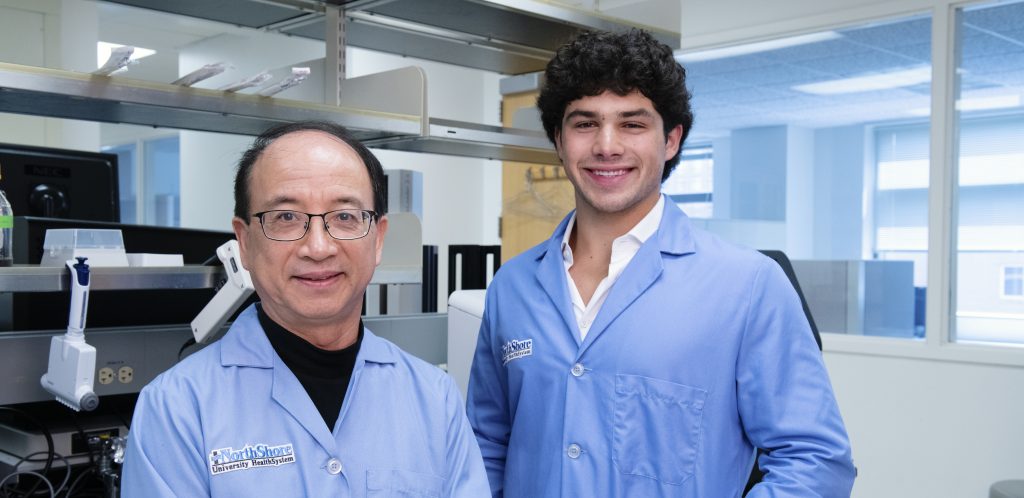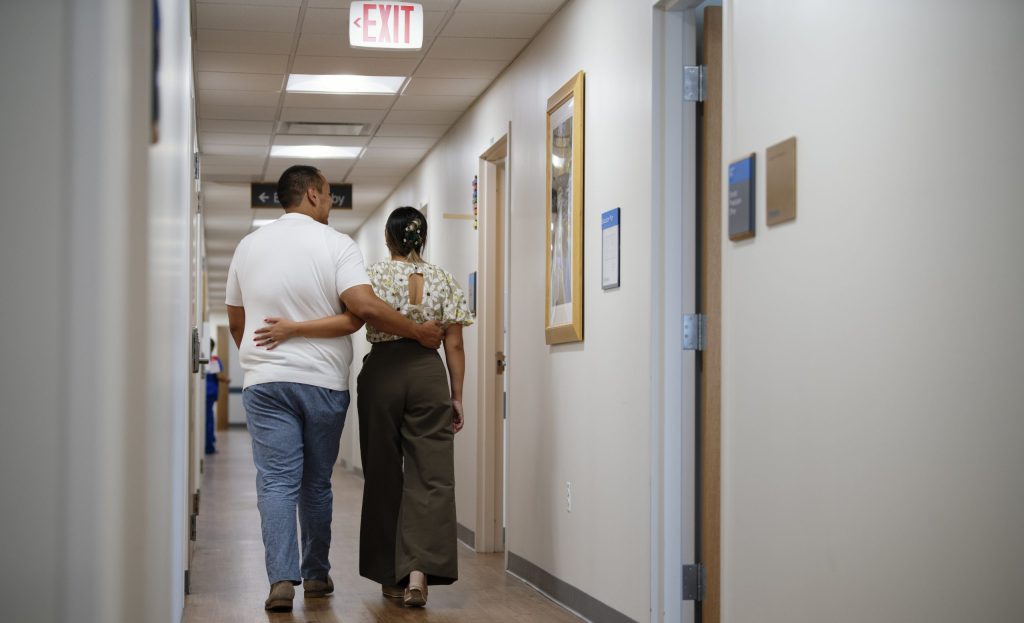It can all start with an inquiry.
At NorthShore University HealthSystem (NorthShore), a summer camp for student-led research was spurred by a simple inquiry that has since grown into real-life applications and potential patient treatment approaches.
During the early part of the COVID-19 pandemic, Joe Hulsizer, a sophmore at Lake Forest Academy, wondered if sickle cell disease in African Americans could affect risk factors and morbidity for COVID-19. Eager to pursue this important topic, he drafted a research proposal and pitched it to different academic and medical research institutions around Chicago.
While several institutions turned down Hulsizer’s research proposal, it caught the attention of Michael S. Caplan, MD, Chief Scientific Officer for the NorthShore Research Institute, and Jianfeng Xu, MD, DrPH, the Ellrodt-Schweighauser Family Chair of Cancer Genomic Research and Vice President of Translational Research at NorthShore
Throughout the summer of 2021, Dr. Xu and Hulsizer worked together to test the hypothesis and found that sickle cell disease does, in fact, impact COVID-19 outcomes in African Americans. They published the research findings, “Association of Sickle Cell Trait with Risk and Mortality of COVID-19: Results from the United Kingdom Biobank,” in The American Journal of Tropical Medicine and Hygiene.
“Joe really enjoyed the analysis process and the overall experience of writing the research paper,” said Dr. Xu. “This study eventually became the impetus for a clinical trial here at NorthShore to study the sickle cell trait in African Americans so we can better understand if there are increased health risks in other diseases.”
From a proposal to a program
Following his involvement in Hulsizer’s research project, Dr. Xu decided to pilot a second summer research program in 2022. The Personalized Medicine Summer Camp accepted six students ranging from high school to undergraduate college to medical school. The students were given a choice of several genomic translational projects and were paired with a NorthShore clinician with a similar clinical interest to work with them on the research project over the course of 10 weeks.
The outcome from this pilot camp program resulted in seven research papers featuring the students as first authors. All of these papers were either published in scientific journals or are currently in review for publication.
“It’s really a novel internship program for students,” said Andrew Rifkin, Research Study Coordinator at the Research Institute. “By working with physicians and researchers, students learned to review research papers, develop hypotheses, perform data analysis, interpret results and summarize findings.”
Although the Research Institute had never offered this type of personalized medicine internship program previously, NorthShore is unique in its structure because it’s easier to connect students directly with physicians, unlike larger academic medical centers. It also increases genomics education for not only the students but also the physicians, who likely learned very little about genetics in medical school.
“Students get more from this program than a regular summer internship,” said Dr. Xu. “They get to develop a one-on-one relationship with physicians and add an impressive achievement in their résumé. The experience inspired them to pursue research in personalized medicine.”
Real-life research applications
The 2022 pilot summer camp demonstrated that there’s an interest in personalized medicine research from both students and NorthShore physicians. In the coming years, Dr. Xu hopes to continue the project, but this depends heavily on available operational funds and philanthropic support.
The expansion of the program from its first year was made possible in part by generous local donors. The Myra Rubenstein Weis Executive Committee also provided helpful funding to sponsor two summer research interns.
In the future, Dr. Xu would like to do more to recruit minorities to participate in the program, as well as underrepresented students. For those students, it’s important to offer access to these research opportunities because they may not have access to them otherwise.
“We need a diverse population of students and give them opportunities to engage in direct research that they may not have at their home institutions,” said Rifkin.
For Dr. Xu, the Personalized Medicine Summer Camp is a crucial experience for students interested in a career in research. It provides hands-on research experience and the opportunity to work alongside physicians. The students can also become first authors of peer-reviewed journal articles.
The program exposes students to genetics early in their academic career and perhaps inspires them to pursue future research in personalized medicine. This is a source of optimism for Dr. Xu and his colleagues at the Research Institute.
“A program like this offers an opportunity to educate students with presumption—they absorb everything,” said Dr. Xu. “Unlike many of us more established researchers and physicians who may already have our own opinions or bias, these students ask, ‘Why not?’”
Masthead photo (left to right): Jianfeng Xu, MD, DrPH and Joe Hulsizer
Photo Credit: Jon Hillenbrand



